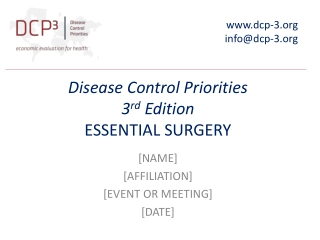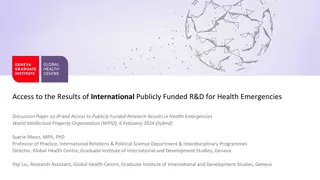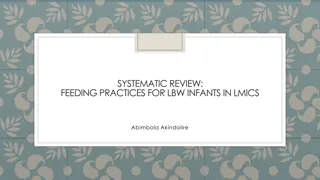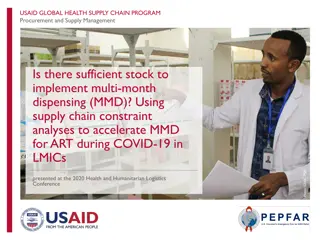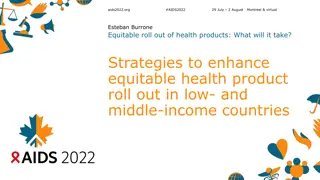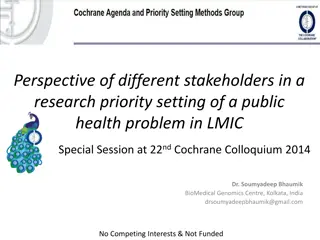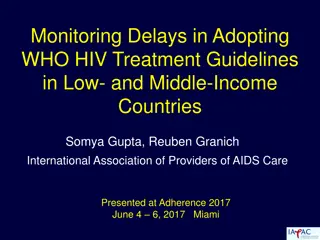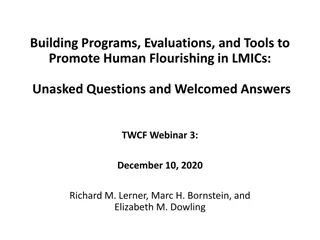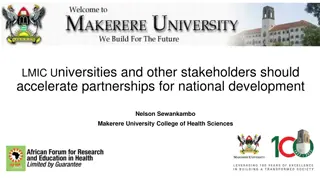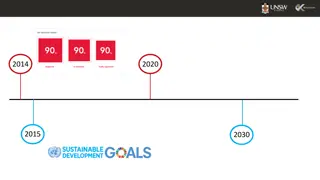Essential Surgery: Improving Global Health
Explore the impact of essential surgical procedures on reducing mortality rates in LMICs. Discover cost-effective interventions to enhance surgical care accessibility and safety across different economic levels.
1 views • 9 slides
Access to the Results of International Publicly Funded R&D for Health Emergencies
Discussion paper on IP and access to publicly funded research results in health emergencies presented by WIPO, focusing on the role of the public sector in driving health emergency R&D, access conditions for international projects, and growing capacity in LMICs. Key points include leveraging public
0 views • 26 slides
Feeding Practices for LBW Infants in LMICs
Improved survival rates of small babies highlight the importance of nutrition for LBW infants. Research into feeding practices in LMICs is crucial for promoting growth and development. Studies compare formula milk to human milk, exploring effects on growth, development, morbidity, and mortality. Evi
0 views • 21 slides
Cost Analysis Interim Results for MITS Implementation in LMIC Settings
Building the evidence base for Minimally Invasive Tissue Sampling (MITS) adoption in Low- and Middle-Income Countries (LMICs) can enhance cause of death data quality and inform effective interventions to prevent mortality. This study aims to understand cost implications associated with MITS implemen
0 views • 22 slides
Analysis of mRNA Technology Transfer Programme in the Global South: Pros, Cons, and Future Directions
The mRNA technology transfer programme in the Global South aims to enhance health security by establishing mRNA manufacturing capabilities in low- and middle-income countries. The programme, led by Afrigen in South Africa, focuses on empowering LMICs to produce mRNA vaccines initially for COVID-19,
0 views • 9 slides
Accelerating Multi-Month Dispensing for ART in LMICs: Supply Chain Insights
This content discusses the utilization of supply chain constraint analyses to expedite Multi-Month Dispensing (MMD) for ART during COVID-19 in Low- and Middle-Income Countries (LMICs). It explores the stock impact and consequences of implementing MMD3 or MMD6, scenarios of moving patients to MMD6 im
0 views • 12 slides
Enhancing Equitable Health Product Roll-out in Low- and Middle-Income Countries
Strategies to enhance equitable access to health products in low- and middle-income countries will be discussed at the AIDS 2022 conference, focusing on key factors such as availability, acceptability, affordability, accessibility, and quality. The Medicines Patent Pool aims to increase access to in
0 views • 14 slides
Stakeholder Perspectives on Research Priority Setting for Public Health in LMICs
Stakeholders in a special session at the 22nd Cochrane Colloquium 2014 discussed the importance of involving diverse stakeholders in research priority setting for public health issues in Low- and Middle-Income Countries (LMICs). Key topics included barriers to patient involvement, challenges in addr
0 views • 13 slides
Monitoring Delays in Adopting WHO HIV Treatment Guidelines in LMICs
Scientific evidence supports immediate ART in preventing illness and deaths. WHO guidelines, revised in 2015 to recommend treating all PLHIV regardless of CD4 count, have seen delays in adoption at the national level in low- and middle-income countries (LMICs). This study quantifies delays in adopti
0 views • 14 slides
Promoting Human Flourishing in LMICs: Insights from TWCF Webinar Series
Explore the discussions on character virtue development, program design, and evaluation in low- and middle-income countries (LMICs) from the TWCF webinar series led by Richard M. Lerner, Marc H. Bornstein, and Elizabeth M. Dowling. Discover valuable insights on reliability, validity, and the use of
0 views • 67 slides
Accelerating Partnerships for National Development in LMICs
LMIC universities and stakeholders must enhance partnerships to address the challenges posed by disruptive changes, including the knowledge economy, globalization, technological advancements, the COVID-19 pandemic, and climate change. Inadequate collaboration, historical relationships, weak infrastr
0 views • 9 slides
Cost-effectiveness of Scaling HIV and Syphilis Testing in LMICs
The systematic review explores the costs and cost-effectiveness of scaling up HIV and syphilis testing in low and middle-income countries. It analyzes the fixed and variable components of costs, economies, or diseconomies of scale, and the setting for scaling up. The study acknowledges key contribut
0 views • 7 slides
